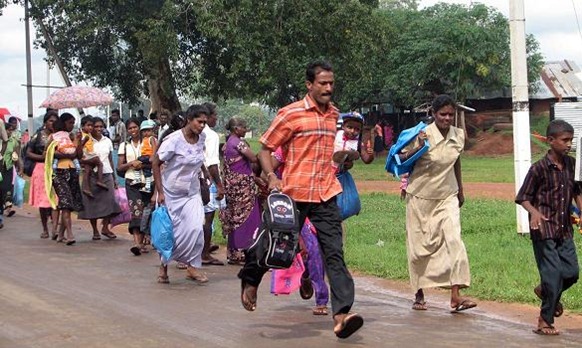 Thousands of Tamil civilians poured out of internment camps in northern Sri Lanka today after the Government opened up the controversial facilities in which here they have been held since the defeat of the Tamil Tiger rebels in May.
Thousands of Tamil civilians poured out of internment camps in northern Sri Lanka today after the Government opened up the controversial facilities in which here they have been held since the defeat of the Tamil Tiger rebels in May.
The last 130,000 of almost 300,000 originally detained were granted freedom of movement, although many will remain in the camps because their villages have been destroyed or are still covered in landmines and unexploded ordnance.
“We have started a new phase of our resettlement programme from today,” said G.A. Chandrasiri, the Governor of Northern Province, where most of the detainees were held in the vast Manik Farm camp complex.
“We have turned all the IDP [internally displaced people] camps into open camps.”
Mr Chandrasiri said that the inmates were free to leave and return at will, and would be given time to decide whether to return to their homes, which are mostly in the Tigers’ former territory in the north and northeast.
“They can go to their villages, visit relatives and come back to the camps if they wish,” he said. “They can stay in the camps until they arrange accommodation elsewhere.”
The move follows several months of intensifying international pressure to open up the camps, which have been among the most contentious aspects of the Government’s victory in a 26-year civil war.
All civilians fleeing the front line in the final months of the war were forced to enter the camps — which were called “welfare villages” but surrounded by barbed wire and guarded by soldiers.
The Government said that the camps were necessary in order to screen the civilians for Tigers and to allow time to clear their villages of landmines. It promised to resettle 80 per cent by the end of the year and has released more than half over the past few months.
Tamil MPs and activists from Sri Lanka, India and Britain likened the facilities to concentration camps and several rights groups denounced them as an illegal form of collective punishment.
The United Nations and international aid groups repeatedly criticised conditions inside, where drinking water and toilets were scarce and access for foreign aid workers and reporters highly restricted.
In October, Britain threatened to cut off funding for the camps — channelled through the UN — if the Sri Lankan authorities did not speed the release of all the remaining inmates.
More recently, the slow pace of resettlement was criticised by General Sarath Fonseka, the former army chief who led the campaign against the Tigers who resigned from the army last month and is now running against President Mahinda Rajapaksa in an election in January.
Last week, the Government finally agreed to allow the remaining inmates freedom of movement and to close the camps entirely by January 31. The UN, Britain and several other foreign governments have welcomed the decision and are now waiting for details about how the registration and resettlement process will work.
“The UK has repeatedly called for civilians to be freed and allowed the choice to return home,” said Mike Foster, the International Development Minister. “But now it is imperative that humanitarian agencies be allowed full access to give them the help they need in all the places that they return to.”
N. Thirugnanasampanther, a senior civil servant in the northern town of Vavuniya, said that more than 6,000 people had already left the camps today. “Transport out of the camps is a problem, but people seem to be very happy,” he said.
Many of those trying to leave the camps also said that they were being held up by a lack of transport and cash. “We have not received any assistance from the authorities to go and see our relatives, but this is better than being locked inside,” one detainee, E. Thavamani, told reporters as she waited for a bus.
V. Pushpavathi, 38, said she was allowed to leave her camp for a week, after being detained for seven months, but was told that she would lose state aid for re-settlement if she did not return.
(For updates you can share with your friends, follow TNN on Facebook and Twitter )
